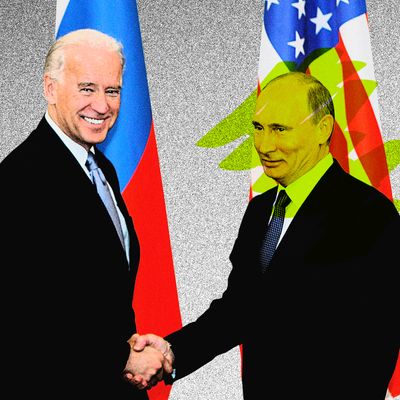
George W. Bush is remembered for his unerring judgment in office, but once in a while he got something wrong.
In 2000, the 43rd president delivered an infamously sanguine verdict on Vladimir Putin after meeting the new prime minister of Russia, who took office at the dawn of the new millennium, for the first time.
Responding to a press-conference question about whether America could trust Putin and Russia, Bush told reporters, “I looked the man in the eye. I found him to be very straightforward and trustworthy. We had a very good dialogue … I was able to get a sense of his soul.”
To be fair to W., the Putin of 22 years ago was merely a blandly menacing figure, not yet the dictatorial madman he has matured into. Still, Bush’s comments — not to mention his later lighthearted exchanges with Putin, or “Pootie Poot” as Bush imaginatively nicknamed him — aged quite poorly.
The “soul” line gained such notoriety that it inspired multiple riffs from politicians in later years, in an effort to prove that they would not be so easily hoodwinked by Pootie Poot. In 2008, Republican senator, presidential nominee, and super-hawk John McCain said of Putin during a presidential debate with Barack Obama: “I looked into his eyes and saw three letters, a K, a G, and a B.” (McCain may have borrowed this laugh line from Colin Powell.) McCain added, presciently, “Watch Ukraine. Ukraine, right now, is in the sights of Vladimir Putin.”
Joe Biden upped the ante in 2014, when he claimed that during a visit to the Kremlin three years earlier, he had informed Putin to his face that the man had no soul at all — and that the Russian leader basically agreed with this damning assessment. The anecdote appeared in Evan Osnos’s New Yorker profile of the then-vice-president:
To illustrate his emphasis on personality as a factor in foreign affairs, Biden recalled visiting Putin at the Kremlin in 2011: “I had an interpreter, and when he was showing me his office I said, ‘It’s amazing what capitalism will do, won’t it? A magnificent office!’ And he laughed. As I turned, I was this close to him.” Biden held his hand a few inches from his nose. “I said, ‘Mr. Prime Minister, I’m looking into your eyes, and I don’t think you have a soul.’ ”
“You said that?” I asked. It sounded like a movie line.
“Absolutely, positively,” Biden said, and continued, “And he looked back at me, and he smiled, and he said, ‘We understand one another.’”
It does indeed sound like a movie line — or perhaps one in a string of questionable Biden anecdotes. Though he can’t hope to compete with his predecessor in the “making up flattering stories” department, Biden undoubtedly has a penchant for tall tales. There’s the one about the train conductor who congratulated Biden on his Amtrak frequent-rider status, but actually died before the relevant conversation could have taken place. There’s the one about getting arrested in South Africa while trying to see Nelson Mandela speak. (That piece of fabulism was so glaring that his campaign team had to walk it back.) And of course there’s the classic Biden tale about confronting gang leader and “bad dude” Cornpop with a six-foot chain, which is so ridicul — hang on, that story might actually be true.
Whether Biden actually insulted Putin to his face will probably never be confirmed. For his part, Putin, that wellspring of reliable information, claims not to remember the exchange. “As far as soul, I’m not sure. One has to think about what soul is,” he said, per a translation that made him sound even more sinister than usual.
But the story does capture the essence of Biden’s wary stance toward Putin. And it’s one that, as Politico notes, he has maintained for more than 20 years. Days after Bush’s 2001 comments, Biden said, straightforwardly, “I don’t trust Putin.” Throughout the early and middle years of Putin’s tenure, Biden voiced his skepticism again and again, even as he helped preside over President Obama’s attempted “reset” with Russia. His evaluations of Putin have naturally gotten harsher in the aftermath of Putin’s Crimean annexation, meddling in the 2016 election, poisoning of Alexey Navalny, and other horrors. In March 2021, Biden called the Russian a “killer,” to which Putin responded by ominously wishing the president “good health.”
As Biden ramps up the punishment for Russia’s atrocities in Ukraine, he can credibly say that he correctly judged Putin right from the beginning. Most of the Russia optimists from the turn of the millennium reversed course a long time ago; these days, George W. Bush is warning about Putin’s “authoritarian bullying.” There may be one ex-president who’s still into Vlad, but the current commander-in-chief saw all this coming.
More on Russia
- Everybody Is Mad at Bloomberg for Its Embargo-Breaking Gershkovich Scoop
- Who Was Exchanged in the Big Russian Prisoner Swap?
- Has the Havana Syndrome Mystery Finally Been Solved?






























